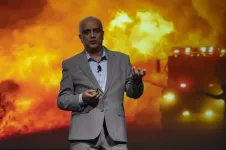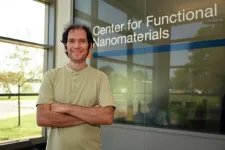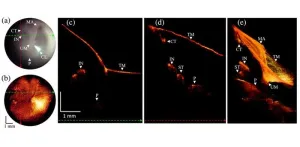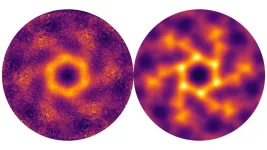(Press-News.org) People with multiple sclerosis (MS) are far less likely than those without the condition to have the molecular hallmarks of Alzheimer’s disease, according to new research from Washington University School of Medicine in St. Louis.
The discovery suggests a new avenue of research through which to seek Alzheimer’s treatments, said Matthew Brier, MD PhD, an assistant professor of neurology and of radiology and the study’s first author.
“Our findings imply that some component of the biology of multiple sclerosis, or the genetics of MS patients, is protective against Alzheimer’s disease,” Brier said. “If we could identify what aspect is protective and apply it in a controlled way, that could inform therapeutic strategies for Alzheimer's disease.”
The study, an example of clinical observations directly impacting research, was published in the Annals of Neurology.
[caption id="attachment_126979" align="alignleft" width="250"]Brier[/caption]
A collaboration between WashU Medicine experts in Alzheimer’s and MS, the investigation was prompted by a suspicion Brier’s mentor and collaborator, Anne Cross, MD, had developed over decades of treating patients with MS, an immune-mediated disease that attacks the central nervous system. Although her patients were living long enough to be at risk of Alzheimer’s or had a family history of the neurodegenerative disease, they weren’t developing the disease.
“I noticed that I couldn't find a single MS patient of mine who had typical Alzheimer’s disease,” said Cross, the Manny and Rosalyn Rosenthal and Dr. John Trotter MS Center Chair in Neuroimmunology. “If they had cognitive problems, I would send them to the memory and aging specialists here at WashU Medicine for an Alzheimer’s assessment, and those doctors would always come back and tell me, ‘No, this is not due to Alzheimer’s disease.’”
[caption id="attachment_126980" align="alignleft" width="250"]Cross[/caption]
Cognitive impairment caused by MS can be confused with symptoms of Alzheimer’s disease; Alzheimer’s can be confirmed with blood and other biological tests.
To confirm Cross’ observation, the research team used a new, FDA-approved blood test that was developed by WashU Medicine researchers. Known as PrecivityAD2, the blood test is highly effective at predicting the presence of amyloid plaques in the brain. Such plaques are an indicator of Alzheimer’s disease and previously only could be verified with brain scans or spinal taps.
Brier, Cross and their colleagues recruited 100 patients with MS to take the blood test, 11 of whom also underwent PET scans at WashU Medicine's Mallinckrodt Institute of Radiology. Their results were compared with the results from a control group of 300 individuals who did not have MS but were similar to those with MS in age, genetic risk for Alzheimer's, and cognitive decline.
“We found that 50% fewer MS patients had amyloid pathology compared to their matched peers, based on this blood test,” Brier said. This finding supported Cross’ observation that Alzheimer’s appeared to be less likely to develop among those with MS. It is not clear how amyloid accumulation is linked to the cognitive impairment typical of Alzheimer’s, but the accumulation of plaques is generally understood to be the first event in the biological cascade that leads to cognitive decline.
The researchers also found that the more typical the patient’s MS history was, in terms of age of onset, severity and overall disease progression, the less likely they were to have amyloid plaque accumulation in that patient’s brain compared with those with atypical presentations of MS. This suggests there is something about the nature of MS itself that is protective against Alzheimer’s disease, which Brier and Cross are planning to investigate.
MS patients generally have multiple flare-ups of the illness over the course of their lifetimes. During these flare-ups, the immune system attacks the central nervous system, including within the brain. It’s possible that this immune activity also reduces amyloid plaques, the researchers said.
“Perhaps when the Alzheimer’s disease amyloid pathology was developing, the patients with MS had some degree of inflammation in their brains that was spurred by their immune responses,” Brier said. Referring to work by co-author David M. Holtzman, MD, the Barbara Burton and Reuben M. Morriss III Distinguished Professor of Neurology, Brier noted that activated microglia, which are part of the brain’s immune response in MS, have been shown to clear amyloid from the brain in animal models.
Brier and Cross have begun the next steps of this research, both to tease out the possible human genetics involved, as well as to test amyloid plaque development in animal models representing MS.
Several of Brier’s and Cross’ coauthors on this study are affiliated with C2N Diagnostics, a WashU Medicine startup that provided support for the investigation. The PrecivityAD2 test is based on technology licensed to C2N by the university.
END
Multiple sclerosis appears to protect against Alzheimer’s disease
Findings could point to new strategies to treat Alzheimer’s
2024-08-23
ELSE PRESS RELEASES FROM THIS DATE:
DRI’s AWE+ Summit tackles wildfire resilience and recovery
2024-08-23
LAS VEGAS, Nevada — DRI, one of our nation’s leading applied environmental research institutes, together with the DRI Foundation, this week held its inaugural AWE+ Summit -Wildfire Recovery and Resilience: Working Across Silos to Drive Solutions. The summit is a call-to-action for communities to implement measures that support resilience and human adaptability to devastating wildfire events.
Nationally recognized scientific leaders discussed challenges, progress, and hope through actions that will lead to solutions. Speakers included:
President of the National Academy of ...
NIH grant establishes UAB’s Global Research Resource for Human Tuberculosis
2024-08-23
BIRMINGHAM, Ala. – A $5.8 million grant led by Adrie Steyn, Ph.D., of the University of Alabama at Birmingham and the Africa Health Research Institute, or AHRI, in Durban, South Africa, will provide user-requested infected human lung tissue and analytical services to tuberculosis researchers worldwide.
Tuberculosis, or TB, is a bacterial infection that causes 1.3 million deaths and 10.6 million new active cases each year, yet experimental animal models of TB do not reproduce the full spectrum of disease as it occurs in humans. A paucity of human lung tissue ...
Scientists propose guidelines for solar geoengineering research
2024-08-23
Scientists for several years have studied the theoretical effectiveness of injecting sulfur dioxide into the stratosphere to reflect heat from the Sun and offset Earth’s warming temperatures. But they also want to ensure that the solar geoengineering approaches being studied are evaluated for their technical feasibility, as well as their cooling potential and possible ecological and societal side effects.
To guide future work, an international team of scientists led by the U.S. National Science Foundation National Center for Atmospheric Research (NSF NCAR) has published a paper with specific recommendations for evaluating proposals to inject sulfur dioxide, which is known as stratospheric ...
Research spotlight: evaluating hybrid and virtual treatments for children with anxiety and obsessive-compulsive disorder
2024-08-23
Jacqueline Sperling, PhD, a clinical psychologist and assistant professor of Psychology at Harvard Medical School, and co-program director of the McLean Anxiety Mastery Program, led a study investigating the sustainability of outcomes from an intensive group and family-based outpatient cognitive behavioral treatment (CBT) program, that included a hybrid of in-person and virtual treatment sessions for children and adolescents with anxiety disorders and/or obsessive-compulsive disorder (OCD). Her research, which was published last month in Current Developmental Disorders Reports, suggests that an intensive ...
Battelle names Anibal Boscoboinik 'Inventor of the Year'
2024-08-23
Anibal Boscoboinik, a materials scientist at the U.S. Department of Energy’s (DOE) Brookhaven National Laboratory, has been named an “Inventor of the Year” by Battelle Memorial Institute. Battelle, headquartered in Columbus, Ohio, partners with Stony Brook University to form Brookhaven Science Associates, which manages the Lab on behalf of DOE’s Office of Science. Battelle manages or co-manages nine national labs across the country.
At Battelle’s yearly Celebration of Solvers, they award Inventor of the ...
Toward a code-breaking quantum computer
2024-08-23
CAMBRIDGE, MA — The most recent email you sent was likely encrypted using a tried-and-true method that relies on the idea that even the fastest computer would be unable to efficiently break a gigantic number into factors.
Quantum computers, on the other hand, promise to rapidly crack complex cryptographic systems that a classical computer might never be able to unravel. This promise is based on a quantum factoring algorithm proposed in 1994 by Peter Shor, who is now a professor at MIT.
But while researchers have taken great strides in the last 30 years, scientists ...
New imaging device improves ear disease diagnosis
2024-08-23
In the realm of ear health, accurate diagnosis is crucial for effective treatment, especially when dealing with conditions that can lead to hearing loss. Traditionally, otolaryngologists have relied on the otoscope, a device that provides a limited view of the eardrum’s surface. This conventional tool, while useful, has its limitations, particularly when the tympanic membrane (TM) is opaque due to disease.
Enter a groundbreaking advancement from the University of Southern California's Caruso Department of Otolaryngology: a portable OCT otoscope that integrates optical coherence tomography (OCT) with ...
Langbeinites show talents as 3D quantum spin liquids
2024-08-23
A 3D quantum spin liquid has been discovered in the vicinity of a member of the langbeinite family. The material's specific crystalline structure and the resulting magnetic interactions induce an unusual behaviour that can be traced back to an island of liquidity. An international team has made this discovery with experiments at the ISIS neutron source and theoretical modelling on a nickel-langbeinite sample.
When spins in a crystal lattice cannot align to reach a minimum energy together, this is called magnetic frustration. ...
VA funds IU School of Medicine research projects relevant to veterans’ health
2024-08-23
INDIANAPOLIS – Indiana University School of Medicine researchers have cumulatively been awarded nearly $4 million in grant funding through the U.S. Department of Veterans Affairs' Merit Review Award and Career Development programs to support research on diabetes, skin inflammation, cancer and aging.
The Merit Review Award Program supports investigator-initiated research conducted by eligible VA investigators at either VA medical centers or approved sites. This program serves as the VA's primary method for funding basic, preclinical, ...
Researchers identify effective materials for protecting astronauts from harmful cosmic radiation on Mars
2024-08-23
Abu Dhabi, August 23, 2024: Researchers have identified specific materials, including certain plastics, rubber, and synthetic fibers, as well as Martian soil (regolith), which would effectively protect astronauts by blocking harmful space radiation on Mars. These findings could inform the design of protective habitats and spacesuits, making long-duration Mars missions more feasible. Because Mars lacks Earth’s thick atmosphere and magnetic field, astronauts exploring the planet would be exposed to dangerous levels of radiation.
Dimitra Atri, Investigator, ...
LAST 30 PRESS RELEASES:
The Lancet: First-ever in-utero stem cell therapy for fetal spina bifida repair is safe, study finds
Nanoplastics can interact with Salmonella to affect food safety, study shows
Eric Moore, M.D., elected to Mayo Clinic Board of Trustees
NYU named “research powerhouse” in new analysis
New polymer materials may offer breakthrough solution for hard-to-remove PFAS in water
Biochar can either curb or boost greenhouse gas emissions depending on soil conditions, new study finds
Nanobiochar emerges as a next generation solution for cleaner water, healthier soils, and resilient ecosystems
Study finds more parents saying ‘No’ to vitamin K, putting babies’ brains at risk
Scientists develop new gut health measure that tracks disease
Rice gene discovery could cut fertiliser use while protecting yields
Jumping ‘DNA parasites’ linked to early stages of tumour formation
Ultra-sensitive CAR T cells provide potential strategy to treat solid tumors
Early Neanderthal-Human interbreeding was strongly sex biased
North American bird declines are widespread and accelerating in agricultural hotspots
Researchers recommend strategies for improved genetic privacy legislation
How birds achieve sweet success
More sensitive cell therapy may be a HIT against solid cancers
Scientists map how aging reshapes cells across the entire mammalian body
Hotspots of accelerated bird decline linked to agricultural activity
How ancient attraction shaped the human genome
NJIT faculty named Senior Members of the National Academy of Inventors
App aids substance use recovery in vulnerable populations
College students nationwide received lifesaving education on sudden cardiac death
Oak Ridge National Laboratory launches the Next-Generation Data Centers Institute
Improved short-term sea level change predictions with better AI training
UAlbany researchers develop new laser technique to test mRNA-based therapeutics
New water-treatment system removes nitrogen, phosphorus from farm tile drainage
Major Canadian study finds strong link between cannabis, anxiety and depression
New discovery of younger Ediacaran biota
Lymphovenous bypass: Potential surgical treatment for Alzheimer's disease?
[Press-News.org] Multiple sclerosis appears to protect against Alzheimer’s diseaseFindings could point to new strategies to treat Alzheimer’s





